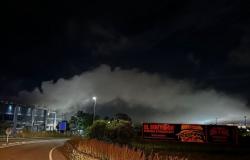It was just 80 years ago, April 28, 1945. The Ticino city in Chiasso, on the Italian border, woke up against hundreds of German rifles and helmets. Devocated in the face of the offensives of the allies in Northern Italy, the desperate German soldiers were trying to take refuge in Switzerland.
On April 28, 1945, the Ticino city of Chiasso woke up at the darkest dawn in its history. When the light touches the barbed wire of the customs post on the Italo-Swiss border, on the other side, the German helmets and the metal of the machine guns sparkle.
Three hundred German soldiers, piled up in No Man’s Land between Switzerland and Italy, are waiting, threatening to force the passage. Among them, SS, members of the Kriegsmarine, but above all, men – sometimes boys – are everything to avoid falling into the hands of Americans.
At the end of April 1945, Allied tanks overwhelmed Milan, Côme and almost all northern Italy. On May 2, Italy was officially released, from north to south, in its entirety. Mussolini is a fugitive and saw the last hours of his life, shortly before his expeditious execution – also on April 28, 1945 – not far from Chiasso, in the small Italian village of Giulino Di Mezzegra. War is now coming to an end.
External contents
This external content cannot be displayed because it is likely to collect personal data. To see this content you must authorize the category Services Tiers.
Accept More info
German soldiers on the run
But the last German soldiers, including SS, those who have occupied the whole north and the center of Italy since September 1943, then seek a way out. They want to cross the Swiss border, fearing the worst: being shot or captured by the allies and delivered to the Soviets to end up disappearing in prison camps in the USSR. The Germans do not want to surrender, the allies want to capture them. And in the middle, Swiss soldiers cannot let the Germans armed into a neutral territory.
This April 28, 1945 in the morning, the air is electric. The Swiss command quickly released the Corso San Gottardo, a major artery from Chiasso. The deserted streets only resonate with steps measured by the patrols and the distant roar of American armored vehicles advancing from the Italian city of Côme.
The three thousand Swiss soldiers mobilized at the border are on maximum alert, heavy machine guns pointed out to Italy, the guns of the 23rd motorized group deployed in strategic positions.
The exchanges of fire between Americans and Germans could overflow on Swiss territory. Hundreds of soldiers and civilians could die. But the order of Bern is clear. The Germans should not enter.
Colonel Ticinois Mario Martinoni, negotiator of German surrender
It was then that a man acts. Colonel Ticino Mario Martinoni, regiment commander, goes up to a car, crosses the border and rushes to Côme. He has no card, no contacts, he wanders in streets in ruins, among buildings riddled with bullets.
He asked a few soldiers there. Finally, one of them led him to the Swiss Metropolis hotel, on the Piazza Cavour, the main square of Côme where, among sandbags and armed men, he finds the headquarters of the 13th armored regiment and meets the American major Joseph McDivitt.
After a few frantic minutes, he obtained what he was looking for: the promise that the German soldiers will not be delivered to the Soviets, but interned in American camps. Mario Martinoni leaves. The car rushes at full speed to the border.
In Chiasso, with Joseph McDivitt and the Swiss consul in Milan Franco Brenni, he convinced the Germans to go. One by one, crying, the soldiers lay their weapons. Some kiss their rifles before giving them back, others advance their heads down, in silence. A short and dignified ceremony, granted to save their honor.
Ingratitude of history
“Bravo Martinoni! Bravo Colonel!”. The inhabitants of Chiasso flock to the streets. Mario Martinoni saved the city. He avoided a massacre.
But on the other side of the line, in Lucerne, the tone is very different. The next day, 1,500 Ticino soldiers were replaced by Swiss German troops, considered more reliable. According to his superiors, Mario Martinoni would have abandoned his command post without authorization. Instead of receiving a medal, he will be removed from his functions and punished.
The Ticino colonel will only be rehabilitated after his death in 2010. Today, a glass plaque in front of the customs of Chiasso commemorates him with a few words, stronger than any insignia: “He spared this city the horrors of war.”
External contents
This external content cannot be displayed because it is likely to collect personal data. To see this content you must authorize the category Services Tiers.
Accept More info
Original Article: Jonas Marto (RSI)
French adaptation: Julien Furrer (RTS)








